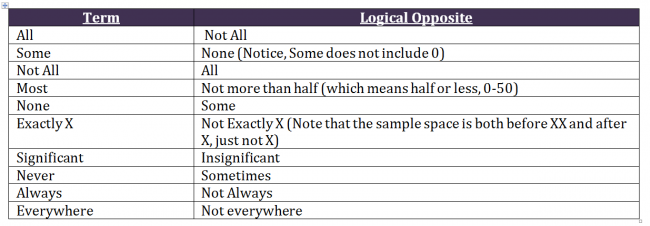Negation for GMAT Assumption
One category of CR questions tested on GMAT Verbal is “Assumption” questions. An assumption is essentially an unstated premise, i.e., what is missing in the argument as the author goes from the premise to the conclusion. In other words, it is the bridge between the premise and the conclusion. An assumption is a bit of information that is mandatory for the argument to be valid but that the author does not explicitly put down on paper. Rather, he “assumes” it. Let us understand the concept of assumption, and how we can deploy the negation strategy to attack such questions on the GMAT. Let us consider the following sample argument:
David eats bananas every day. Therefore, David must have a superior IQ.
In this case, the author states that because David eats bananas every day—a healthy habit, of course—he must have a superior IQ. So, a basic assumption made by the author is that “eating bananas every day = superior IQ“.
Now, note that this also implies that if “eating bananas every day” DID NOT correspond to an “improved IQ,” the argument would fall apart. In other words, if the assumption were to be negated, the argument would be destroyed. This is the essence of the negation strategy. Since an assumption must be true for the argument to be valid, if we negate the assumption, the argument will be negated.
Using the negation strategy on GMAT assumption questions is time-effective and foolproof. Because the wording of the options on the GMAT CR questions is not very “direct”, this method ensures that you have a higher probability of selecting the correct answer. Negate the 2 options that you have narrowed it down to—usually, we can eliminate 3 out of 5 options for various reasons such as being out of scope, irrelevant, incorrect comparison, or such—and negate each. The correct answer is the option that, when negated, destroys the argument.
HOW TO NEGATE
- Negate EITHER the main verb OR a quantifier in an option (based on whichever is easier to comprehend). DO NOT negate both the main verb and the quantifier! This will simply bring us back to the original sentence. For example,
The negation of “David does not go to the office” will be “David DOES go to the office” – we negate the main verb.
The negation of “Bananas are a primary component in David’s diet” will be “Bananas are a secondary component – we negate “primary” – in David’s diet”
-
In sentences where subordinate conjunctions – if, since, because, while, whereas, although, even though, though, as, unless, etc. – are present, always negate the independent clause. For example, the negation of “If David eats bananas, he will have a better IQ”, will be “If David eats bananas, he will NOT have a better IQ”.
We DO NOT negate the dependent clause in such cases – i.e., the negation of the above statement will not be “if David does not have bananas, he will have a better IQ”.
- Be careful when negating adverbs (usually words ending with “-ly”) in a sentence option. Negating the adverb can have different results from what one would usually expect. This is quite often a common trap in the incorrect options on GMAT Verbal. To understand this idea, let us look at the following two sentences:
a) John’s income has increased.
Negated, this option reads “John’s income HAS NOT increased”; In other words, John’s income has either decreased or remained the same.
b) John’s income has increased significantly.
Negated, this option reads “John’s income HAS NOT INCREASED SIGNIFICANTLY”. In other words, John’s income has still increased (maybe by 0.5% or 1% or some statistically insignificant amount as such) – just that it has not increased in any substantive manner.
Adverbial negations are among the trickier negations on the GMAT to master. In general, adverbs, because they act as quantifiers, play a significant role in determining the difference between a trap option and the correct option, especially in inference and assumption questions.
I have also attached an image containing the negations of common quantifiers you will encounter in GMAT CR assumption questions. We have compiled this list based on the past 20 editions of official guide questions. Please note that some quantifiers may not be covered in this list.
I hope this post was useful, and happy prepping for the GMAT! Please reach out to me (via the chat functionality) if you have any queries.

